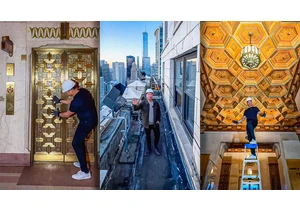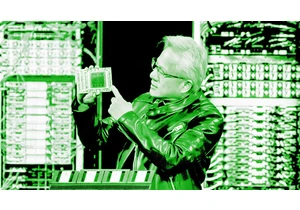Where else could you tuck into a bowl of python pasta, soundtracked against the prerecorded grunts and grumbles of gorillas and screech of live parrots? For ’90s kids hosting at least one, if not many, of your birthday meals surrounded by animatronic wildlife at the Rainforest Cafe was a right of passage. Now, the eatertainment chain is going viral online.
While some of the chain’s renewed popularity can be chalked up to nostalgia, its appeal has evolved to include Gen Zers who missed the restaurant’s heyday and are posting videos of their first-time visits. “This and yap,” one TikToker posted alongside clips of the restaurant’s food and decor. “I don’t care what anyone says, thunderstorms at rainforest cafe are my safe space,” another creator posted. “This is your sign to dress up and go to the rainforest cafe,” added another.
@kookiedough09 The food here (although expensive) was pretty good Also i bought a hat #rainforestcafe #brat #bratsummer #apple #niagarafalls @Rainforest Cafe
♬ apple x supercut – jevan
A post on X unpacked the chain’s enduring appeal: “You’re not just there for the food; you’re there for the *adrenaline*. The fear that any second, a mechanical elephant might glitch out or lightning might flash above your head while you’re halfway through your entree—it’s the thrill, the drama.”
I THINK !!Rainforest Cafe knew what was up. They tapped into something deep within us—some primal part of the human experience that says, "Sure, I want to enjoy a nice meal, but can I also be surrounded by simulated thunder, gorilla roars, and creepy animatronics? Because that’s…
— positivity moon (@arrtnem) September 28, 2024
At its peak, Rainforest Cafe boasted around 45 locations worldwide, all stemming from founder Steven Schussler’s ambitious vision. He opened the first location in 1994 at the Mall of America in Bloomington, Minnesota, in part as an ode to wildlife and a call for conservation. But these days, with only 16 locations left in North America, Rainforest Cafe is almost as endangered as the actual rainforest. After Steven Schussler sold the chain to Landry’s Inc. in 2000, the number of restaurants dwindled, but its cultural relevance has lived on.
Earlier this year, an April Fools’ Day post from the Empire State Building’s official account teased an exciting announcement: “BREAKING: We’re excited to announce the launch of the World’s Highest Rainforest Cafe right here at the Empire State Building”. While commenters quickly caught on to the joke, many expressed genuine disappointment that they couldn’t enjoy jungle steak alongside animatronic gorillas in the sky. “Okay but what if…..” the official account later commented under the viral post. Six months later, Rainforest Cafe and the Empire State Building teamed up to grant the internet’s wish, hosting a weekend-long pop-up on the skyscraper’s rooftop in October.
Long live the Rainforest Cafe.
https://www.fastcompany.com/91239649/social-media-falling-in-love-with-rainforest-cafe-all-over-again?partner=rss&utm_source=rss&utm_medium=feed&utm_campaign=rss+fastcompany&utm_content=rssLogin to add comment
Other posts in this group


One of the more unique takes on the POV trend on TikTok: “POV: You bought a 100-year-old skyscraper . . . ”
For those unlikely to ever own a skyscraper themselves, TikTok’s Skyscraper Gu

When it comes to sharing Instagram Reels with friends, the process of three taps to get a Reel from A to B can feel surprisingly tedious. Now, Instagram has addressed that issue with its latest fe

New Jersey filed a lawsuit against Discord on Thursday, alleging that the social platform recklessly exposed children to “harassment, abuse, and sexual exploitation by predators who lurk on

Google has acted illegally to maintain a dominant position in online advertising, a federal judge ruled on Thursday. The tech giant’s “exclusionary conduct substantially harmed Google’s publisher

Welcome to AI Decoded, Fast Company’s weekly newsletter that breaks down the most important news in the world of AI. You can sign up to receive this newsletter ever

